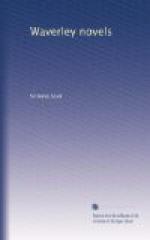While the soldiers pursued the cause of their disturbance in one direction, Waverley, adopting the hint of his remaining attendant, made the best of his speed in that which his guide originally intended to pursue, and which now (the attention of the soldiers being drawn to a different quarter) was unobserved and unguarded. When they had run about a quarter of a mile, the brow of a rising ground which they had surmounted concealed them from further risk of observation. They still heard, however, at a distance the shouts of the soldiers as they hallooed to each other upon the heath, and they could also hear the distant roll of a drum beating to arms in the same direction. But these hostile sounds were now far in their rear, and died away upon the breeze as they rapidly proceeded.
When they had walked about half an hour, still along open and waste ground of the same description, they came to the stump of an ancient oak, which, from its relics, appeared to have been at one time a tree of very large size. In an adjacent hollow they found several Highlanders, with a horse or two. They had not joined them above a few minutes, which Waverley’s attendant employed, in all probability, in communicating the cause of their delay (for the words ‘Duncan Duroch’ were often repeated), when Duncan himself appeared, out of breath indeed, and with all the symptoms of having run for his life, but laughing, and in high spirits at the success of the stratagem by which he had baffled his pursuers. This indeed Waverley could easily conceive might be a matter of no great difficulty to the active mountaineer, who was perfectly acquainted with the ground, and traced his course with a firmness and confidence to which his pursuers must have been strangers. The alarm which he excited seemed still to continue, for a dropping shot or two were heard at a great distance, which seemed to serve as an addition to the mirth of Duncan and his comrades.




